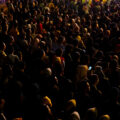New tech, politics, and religion: What is the future of technology in religion?
New tech, politics, and old religion:
What is the future of technology in religion?
The first step towards a techno-savvy saint, the new Ridley Scott series ‘Raised by Wolves’, and the objections of UK religious leaders to a second lockdown might have more in common than meets the eye. They might just suggest the future of technology’s relationship with religion.
An internet-savvy millennial moves towards sainthood. Ridley Scott produces a new futuristic dystopian TV series ‘Raised by Wolves’ where religion, politics, and technology all fight to shape the future of humanity. UK religious leaders object to a second lockdown ban on in-person worship. These three contemporaneous events may seem unconnected, but together they may signal the future of technology’s relationship with religion.
Will Carlo Acutis be the patron saint of new tech?
The Roman Catholic Church has taken a step towards getting its first millennial saint. On 10 October 2020, Pope Francis beatified Carlo Acutis. Beatification is the third step of the four-step process towards canonisation, the technical term for becoming a saint. First, a person is declared a ‘servant of God’ if they lived a sufficiently holy life upon investigation. Second, the person is pronounced ‘venerable’ if they are shown to have displayed ‘heroic virtue’. Third, a miracle attributed to them is verified and they are subsequently beatified and called ‘blessed’. Fourth, after two miracles are verified, they are canonised as a ‘saint’.[1]
In 2006, Carlo Acutis died aged 15 from leukaemia. He was known for his strong faith, for his concern for the poor, and for using his programming skills and the internet to spread the Catholic faith.[2] [3] [4] [5] [6] [7] [8] There are also two miracles claimed for him: 1) the officially verified 2013 healing of a 7-year-old boy in Brazil from a rare pancreatic disorder after touching one of Carlo’s t-shirts; and 2) Acutis mother’s unverified report he also healed a woman from cancer while he was still alive.[9] However, becoming a saint is not merely a matter of having the proper amount of miracles attributed to them, but also especially of the kind of model the church wants to put forward for its people and, to a lesser extent, to the world.[10] This becomes especially clear when we consider what was highlighted about Carlo Acutis. Pope Francis said, “His testimony shows today’s young people that true happiness is found by putting God first and serving people, especially among the poorest in society.”[11] In 2019’s Christus Vivit, the pope exhorts, “Carlo was well aware that the whole apparatus of communications, advertising and social networking can be used to lull us, to make us addicted to consumerism and buying the latest thing on the market, obsessed with our free time, caught up in negativity.”[12]
Pope Francis elevates Acutis as a model of lived faith in a world being shaped by digital technologies. Simultaneously, this challenges the default pattern of human life that these technologies can assume and impose. The pope suggests that as much as it can be used for good, this new tech can also use people and degrade their humanity. The selection of Acutis, then, is not merely a matter of piety or theology, but an intentional move to undermine commitment to the value system of new tech that is baked into the technology and generated as people use it.
Who will be humanity’s wolves? Religion? Politics? Technology?
Meanwhile in Hollywood, Ridley Scott discusses his new TV series ‘Raised by Wolves’.[13] [14] In this series, written by Aaron Guzikowski, androids seek to raise human children in their own image on a new planet. The series deals with religious images. Guzikowski explains, ‘“you’re seeing all of these iconic elements — the serpent, the garden, Adam and Eve — but they’re not the versions we know. We subvert expectations a little bit.”[15] The series intentionally plays with how religious, political, and technological visions of the world intersect and struggle against each other. Scott reflects: “Religion, politics, and technology are the same thing and they [fight to] control one another. They ought to be separated.”[16] So, in the wider cultural landscape, a perception of the competing visions of humanity found in religion, politics, and technology is emerging in the form of a TV series. The struggle between politics and religion is well known, but the entrance of new tech as a competitive and distinctive vision of humanity is now growing as well. In this light, we can understand ‘Raised by Wolves’ as a pop-cultural parallel to the beatification of Acutis.
Religious pushback on politics forcing technology on religion?
This three-way fight becomes clearer when we note that unlike at the beginning of the first lockdown,[17] [18] UK religious leaders strongly objected to banning in-person worship during the second.[19] On 5 November 2020, a letter signed by Archbishop of the Church of England Justin Welby and by high-ranking Catholic, Pentecostal, Jewish, Muslim, Sikh, and Hindu religious leaders was sent to Boris Johnson protesting the ban.[20] [21] They considered it an illegitimate or at least unnecessary use of political power against religious communities. Some even suggest it is a violation of, and/or a threat to, religious freedom.[22] Yet, the letter identifies technologically-mediated services as ultimately problematic, even if pragmatically necessary. Moreover, the letter repeatedly states people’s need to meet and gather in person for worship and the value of embodied presence. These religions are unwilling to allow digital technology (and the vision of the world it brings with it) to shape or determine their communities’ vision of humanity and their values, even if they think being able to use this technology is important. In this way, the UK religious leaders’ objection is a further manifestation of the three-way rivalry between religion, politics, and technology that Scott identifies, when he says “[r]eligion, politics, and technology are the same thing and they [fight to] control one another.”[23]
What is the future of technology in religion?
Old religions are integrating new tech, but not uncritically. Like the beatification of Acutis, they might feel the need to subvert a technological vision of the world by raising up new models of faith. Religions sometimes seek to cooperate with political powers for the public good. Simultaneously, religions must resist ceding too much to them. Correspondingly, religions may soon have to navigate technology as a new competitor. In other words, just as religions presently have to be politically aware, the future celebrated models of faith might also need to be techno-savvy.
Interested in similar topics? Go to our Dashboard and get free updates.
[1] Carlo Acutis: Italian teenager could be first millennial saint
[2] Carlo Acutis, el joven influencer beatificado por el Papa
[3] Beatified millennial: Pope sets late tech whiz on path to sainthood
[4] Carlo Acutis: Italian teenager could be first millennial saint
[5] Who was Carlo Acutis? A CNA Explainer
[6] London-born 15-year-old moves closer to becoming first millennial saint
[7] Carlo Acutis: Millennial generation has a Blessed
[8] London-born teenager to be beatified for his internet work
[9] London-born 15-year-old moves closer to becoming first millennial saint
[10] London-born teenager to be beatified for his internet work
[11] Beatified millennial: Pope sets late tech whiz on path to sainthood
[12] Pope Francis, “Christus vivit”: Post-Synodal Exhortation to Young People and to the entire People of God (25 March 2019), §105
[13] Ridley Scott Talks ‘Raised By Wolves’ And The Future Of The ‘Alien’ Franchise
[14] Ridley Scott Tells Us Why He Directed ‘Raised by Wolves’
[15] ‘Raised by Wolves’: Ridley Scott Explains That Monstrous Finale
[16] Ridley Scott: “La religión, la política y la tecnología son lo mismo y se controlan entre sí. Deben ser separadas”, English translation my own.
[17] Keeping the faith: religion in the UK amid coronavirus
[18] Church of England suspends all services over coronavirus
[19] Faith leaders challenge England lockdown ban on communal worship
[20] Faith communities’ letter to the Prime Minister
[21] Church leaders expect easing of English lockdown ban on communal worship
[22] Faith leaders challenge England lockdown ban on communal worship
[23] Ridley Scott: “La religión, la política y la tecnología son lo mismo y se controlan entre sí. Deben ser separadas”, English translation my own.






